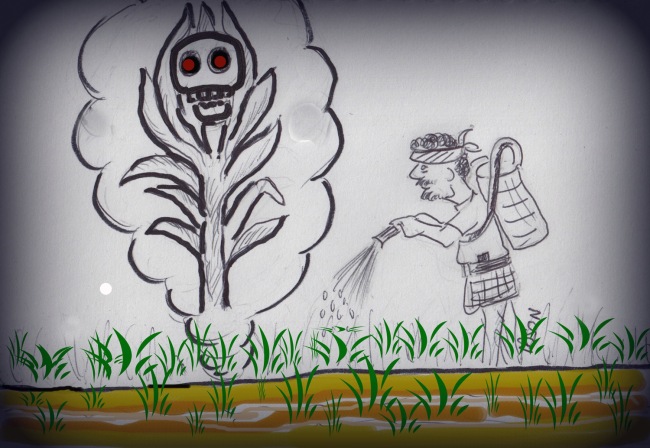Twenty years ago Erin Brokovich an ordinary yet courageous woman with no formal law education fought a relentless legal battle to bring down a powerful California power company accused of polluting the water supply.
It was an epic victory honored later by a series of books and a blockbuster movie.
Fifty years ago Rachel Carson, another valiant woman who grew up in rural Springdale, Pennsylvania opened the eyes of the world to the dangers of indiscriminate use of pesticides in her best seller classic ‘Silent Spring”.
Her veritable voice in the wilderness about the death of songbirds by DDT sprouted the global environment movement, as we know today.
Moved by her thoughts President John F Kennedy set up a presidential committee to study the adverse effects of DDT. It was later banned.
Taking an obvious cue President Richard Nixon set up the highly prestigious and effective Environment Protection Agency (EPA).
The global green movement, led by its advocates and activists is making headway in saving planet earth from an impending doom.
Many are winners in the North, though some not that lucky in the South, mostly in the developing world where the green message seems to have fallen on deaf ears.
With rather faulty fast-forward politically charged goals on food security and craving for export dollars, the cost by way of death and destruction that follows chemical contamination gets sadly overlooked.
The so called rice belt in North Central Sri Lanka, where the use of agro chemicals have been the order of the day down several decades bears testimony to a calamity needing urgent remedy.
Published data indicates that during the past 20 years, there have been 22,000 fatalities in the farming community with another 400,000 critically ill.
A mysterious Chronic Kidney Disease of uncertain aetiology (CKDu) has been linked to indiscriminate use of pesticides and agro-chemicals.
Denials and rebuttals from the highly exploitative industry, its recalcitrant lobbyists, commercial promoters and hidden persuaders continue to echo supportive hosannas while the toll rises almost overnight.
Political will to deal with chemical evils has been rather lackadaisical in the past.
Last week however one saw the emergence of a silver lining when the current Sri Lankan Agriculture Minister planned to ban the use of some letha agrochemicals as well as prohibit their promotion through advertisements. Plans are also afoot to take legal action against violations.
As reported in the Sunday Times, Sri Lanka intends to set up a Technological Council to promote environment-friendly agriculture.
This is a laudable effort in its very essence.
Better late than never.
Hopefully these robust plans will see the light of day soonest with the rest of the lawmakers approving them.
A panel of Sri Lankan experts who studied the syndrome afflicting the farm workers has officially linked the CKD to excessive and indiscriminate use of agro-chemicals.
Independent observers claimed that two lives on the average are lost on a daily basis to CKDu in the affected areas where inadequate medical attention compounds the crisis. Insufficient dialysis systems and overcrowding in hospitals have been cited.
The incidence of disease is quite high in one farming area in Ampara that village folk reportedly nicknamed a street there as ‘ Wakugadu Mawatha’ or Kidney Lane.
The World Health Organization (WHO) is doing its best to combat this disease that afflicts many countries in the Third Word, notably India, Nicaragua and El Salvador.
The world body has identified multiple causes for the malady. Among these are exposure to arsenic and cadmium and water with heavy metal toxins.
One of the most popular and potent agro-chemicals to eliminate weeds is said to contain Glyphosate salt.
During the Vietnam war it was one of the active ingredients used as a defoliant in the infamous Agent Orange which killed and maimed nearly half a million people.
A similar number of children were born with birth defects in that country.
During the past couple of decades weedicides containing Glyphosate were widely used in Sri Lanka thus leading to the current tragedy.
Under supposedly safe brand names aided with subsidies, transnational companies and their cohorts made a kill with the largesse they were able to make.
The projected ban is a step in the right direction.
Agent Orange was a weapon of mass destruction in the same way the pesticide Malathion was, used by Nazis as a nerve gas.
How they came to be used for the greater good of humankind sounds ironic if not outrageous.
Currently hitting the breaking news hotspots, political fora and citizen demos in Sri Lanka is the Weliweriya fiasco over alleged water contamination.
Political and military ramifications of the crisis aside, the core issue seems to be the cry for clean water.
Whatever the outcome of the official investigation would be, the crisis is a wake-up call about pollution in general terms.
Safety precautions and ecological disciplines are foremost.
Horrific tragedies in Bopal and Chernobyl are still fresh in our memory.
One particular area that we should be mindful is about our booming textile industry.
Every precaution should be in place regarding possible groundwater contamination.
According to the World Bank the global textile industry is one of the largest polluters.
More than 20 percent of world’s water pollution is attributable to treatment and dying of textiles.
With stringent regulatory enforcement and supervision, mainly by the Board of Investment (BOI) Sri Lanka’s textile industry seems to be doing well and remaining environmentally clean.
Yet we need to be vigilant against any lapses that could poison the earth.
For, Water is one of Mother Nature’s most valuable gifts to humankind.


Wonderful thoughts to save our world, Rex. Had the perpetrators got half the intelligence and love for the world we live in they wouldn’t act like the worm in the apple and destroy it, just to make a fast buck. Glad about Sri Lanka’s green initiative, too.